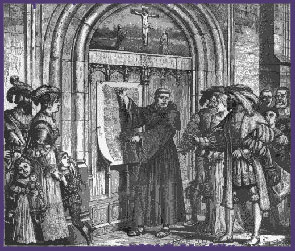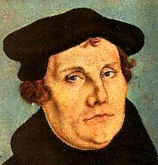June 15: Condemning Martin Luther
Martin Luther Condemned (1520)
It was on this date, June 15, 1520, that Pope Leo X (p. 1513-1521) issued the Bull Exsurge Domine (Arise, O Lord), condemning Martin Luther for forty-one doctrinal errors and threatening him with excommunication if he would not recant. It is instructive to note the nature of the time and the personality of the Pope at the beginning of the long-overdue Reformation, since it was Christ who said, "He without sin among you, cast the first stone" (John 8:7), and it was Christ's Vicar casting stones at Luther.
Giovanni de' Medici (1475-1521) was the son of a wealthy, powerful and politically connected family. His father got him into the priesthood at age 7; he was a cardinal at 13; he became Pope at age 37. Leo X remarked gleefully, "Let us enjoy this Papacy which God has given us." The historian and statesman, Francesco Guicciardini (1483-1540), gives us a fascinating précis of Pope Leo's lifestyle:
His expenditure was such that he degraded the spiritual authority, corrupted the Papal Court, and was compelled to be always in search of extraordinary methods of raising money. He was passionately fond of music and jesters, and his mind was entirely occupied with these. In the early days of his pontificate many believed that he was quite chaste, but it was discovered that he was excessively devoted to pleasures that cannot even be mentioned with decency. (Storia d'Italia, Lib.16, cap.12*)
Those unmentionable pleasures, described delicately as "venery," were not in fact sporting with hawks, but sporting with young boys: that is, sodomy.
If Martin Luther (1483-1546) needed any more evidence that the Papacy was luxuriously corrupt, he had only to look to the current occupant of the Chair of St. Peter. Consuming a surplus acquired by his predecessor, Leo X spent lavishly on banquets, entertainments, jewels and gifts – to the tune of five million ducats, in excess of $33 million in today's currency, over eight years. He was lying and duplicitous in diplomacy and raised money through the sale of offices and indulgences, which combined simony with nepotism.
In Rome, justice still exhibited its medieval brutality: for example, a Jew who had sex with a Christian woman was castrated and forced to carry his testicles through the streets on a pole. So it wasn't surprising that when some clerics, led by Cardinal Petrucci, attempted to poison the Pope, and failed, Petrucci was strangled in prison, his servants had their flesh removed with hot pincers, and Cardinals Riario and Sauli confessed under torture.
So it was this Pope who condemned the errors of Martin Luther, such as that "Indulgences are pious frauds of the faithful, and remissions of good works" (18); and that "The Roman Pontiff, the successor of Peter, is not the vicar of Christ over all the churches of the entire world, instituted by Christ Himself in blessed Peter" (25); or to say "That heretics be burned is against the will of the Spirit" (33).
 Threatening to cut him off from the Catholic community in the 1520 Bull, Leo finally excommunicated Luther on 3 January 1521. At last Leo succumbed to a poisoning on 1 Dec 1521, although modern Catholic historians dispute the physicians who actually saw the dark and swollen body. Luther, inhibited by neither Exsurge Domine nor his excommunication, outlived the next two Popes.
Threatening to cut him off from the Catholic community in the 1520 Bull, Leo finally excommunicated Luther on 3 January 1521. At last Leo succumbed to a poisoning on 1 Dec 1521, although modern Catholic historians dispute the physicians who actually saw the dark and swollen body. Luther, inhibited by neither Exsurge Domine nor his excommunication, outlived the next two Popes.
* "In costui, assunto al pontificato, apparí tanta magnificenza e splendore e animo veramente regale che e' sarebbe stato maraviglioso eziandio in uno che fusse per lunga successione disceso di re o di imperadori: né solo profusissimo di danari ma di tutte le grazie che sono in potestà di uno pontefice; le quali concedeva sí smisuratamente che faceva vile l'autorità spirituale, disordinava lo stile della corte, e per lo spendere troppo si metteva in necessità di avere sempre a cercare danari per vie estraordinarie. A questa tanta facilità era aggiunta una profondissima simulazione, con la quale aggirava ognuno nel principio del suo pontificato, e lo fece parere principe ottimo; non dico di bontà apostolica, perché ne' nostri corrotti costumi è laudata la bontà del pontefice quando non trapassa la malignità degli altri uomini; ma era riputato clemente, cupido di beneficare ognuno e alienissimo da tutte le cose che potessino offendere alcuno. Il medesimo fu deditissimo alla musica alle facezie e a' buffoni; ne' quali sollazzi teneva il piú del tempo immerso l'animo, che altrimenti sarebbe stato volto a fini e faccende grandi, delle quali aveva lo intelletto capacissimo. Credettesi per molti, nel primo tempo del pontificato, che e' fusse castissimo; ma si scoperse poi dedito eccessivamente, e ogni dí piú senza vergogna, in quegli piaceri che con onestà non si possono nominare." – Storia d'Italia, Lib.16, cap.12.
Originally published June 2003 by Ronald Bruce Meyer.


